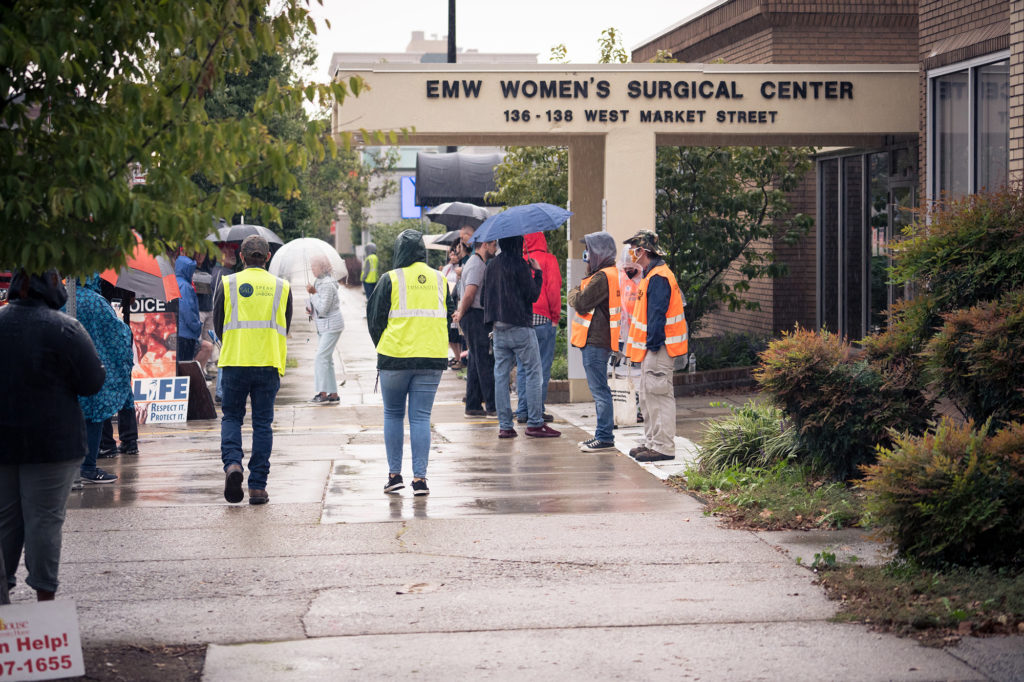
Members of Speak For The Unborn seek to engage in "loving and winsome" ways as they speak to women considering abortion.
Speak For The Unborn wants to train churches how to counsel women outside of abortion clinics in a “loving and winsome” way.
Laurelen Müller, executive director Speak For The Unborn, sees the ministry as an extension of local churches.
“Beyond anything tangible, the first and foremost pillar of our organization is that we are gospel-centered and without that foundation it all kind of falls flat,” Müller said.
“We first and foremost see this as a gospel ministry and we see this as part of the local mission of a church. Scripture makes it very evident that life is to be valued and supported and that God has made us in His Image and values life and therefore we should as well.”
Müller, who is the daughter of The Southern Baptist Theological Seminary professor Donald Whitney, explained the ministry was born out of Immanuel Baptist Church in Louisville, Ky., when a few couples felt a particular call toward pro-life ministry. The couples began praying and making conversation with women outside of a local abortion clinic.
Soon, other like-minded churches in the area heard what Immanuel members were doing and wanted to partner with them. The organization became a 501(c)(3) non-profit ministry in 2016 and began partnering with churches around the country.
Churches can join Speak For The Unborn’s network after completing an eight-week training course featuring trauma-informed resources about how to talk with women considering abortions. Müller said network churches often have a particular sidewalk counseling team, but anyone from the church is invited to join in the training.
“Sidewalk counseling is a massive opportunity that a lot of churches don’t think about,” Müller said.
“Where else do you have the opportunity to share the hope of the gospel with lost individuals in your community in a situation where it’s literally life and death in that moment? It’s a profound opportunity for local urban missions work.”
Due to the sensitivity of the situation the women are in, Müller said a gracious tone is key. She added that women are often surprised by this as they expect a spirit of harshness and judgment.
“We train our churches to come from the heart of, ‘If not for the grace of God, I would be in this person’s shoes right now, and I am going to choose my words and the way I interact from that foundational perspective,’” Müller said.
“It’s important how we share the gospel and the truth that we have, particularly in a moment like sidewalk counseling. Most of the time it’s a very traumatic situation and we don’t know what we don’t know, so we don’t make immediate judgement calls of why she is there.”
Müller noted that just as Speak For The Unborn does not want to be associated with the stereotype of angry people outside clinics with signs, many of the women who speak with volunteers do not fit into the false stereotype of an angry person who hates the life in her womb.
She recalls one example of a woman who came to the clinic and ended up talking with volunteers. Through tears the woman explained how she felt so alone and had no one to talk to about her situation. The woman had told herself if one person had talked to her on the way to the clinic and told her not to do it, then she would not go through with it.
She ended up choosing life for her child. A local church in the network threw her a baby shower and continues ministering to her.
“There are truly women who just feel like no one cares, but there was someone in the situation there who cared enough to say, ‘Please don’t do this. We’ll help you and we’ll walk alongside you,’” Müller said. “They explained your hope does not have to be in this, your hope can be in the blood of Jesus.”
This story illustrates the concept the ministry strives to teach its network of churches – all Christians are called to support human life in all capacities, whether it be sidewalk counseling, adoption and foster care, refugees or any other type of ministry.
“We passionately believe that the local church should be the ones who are involved in standing for life because of the holistic factor and our capacity to support families in every aspect of pro-life ministry,” Müller said. “It’s through the Church that we can provide that big picture of what it looks like to support life from womb to tomb.
“We don’t see sidewalk counseling as the only piece to the puzzle, and we don’t see it as the one answer to all of pro-life ministry and that’s not what we teach our churches. We encourage our churches to take on the culture of everyone finding their role to support life. That’s what really makes the body of Christ so beautiful is that we can all find our particular calling.”
Registration for two January seminars Speak For The Unborn is hosting in Chicago and Memphis, can be found here.
(EDITOR’S NOTE – Timothy Cockes is a Baptist Press staff writer.)


